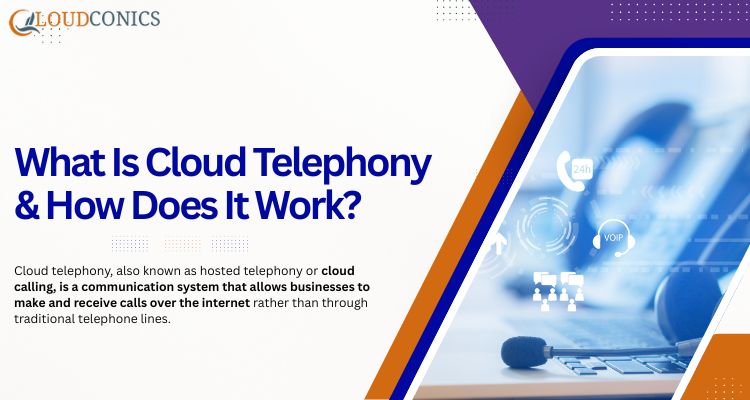
 January 20, 2026
January 20, 2026
What Is Cloud Telephony & How Does It Work?
Introduction
In the digital age, businesses are increasingly adopting cloud-based solutions to enhance operational efficiency and customer engagement. One such innovation is cloud telephony, a technology that enables voice communication over the internet, eliminating the need for traditional telephone lines. This shift not only reduces costs but also offers scalability, flexibility, and advanced features that are crucial for modern businesses.
What Is Cloud Telephony?
Cloud telephony, also known as hosted telephony or cloud calling, is a communication system that allows businesses to make and receive calls over the internet rather than through traditional telephone lines. Utilizing Voice over Internet Protocol (VoIP), cloud telephony systems convert voice signals into digital data packets, transmitting them over the internet to the recipient’s device. This approach offers several advantages over traditional Private Branch Exchange (PBX) systems, including reduced infrastructure costs, scalability, and integration with other business applications.
How Does Cloud Telephony Work?
Cloud telephony operates by connecting users to a cloud-based server through the internet. Here’s a step-by-step breakdown:
- Call Initiation: A user dials a number using a cloud telephony application or IP phone.
- Signal Conversion: The system converts the voice signal into digital data packets.
- Data Transmission: These packets are transmitted over the internet to the recipient’s device.
- Call Reception: The recipient’s device receives the data packets and converts them back into audio signals.
- Call Management: Features like call routing, voicemail, and analytics are managed through the cloud platform.
This architecture eliminates the need for on-premise hardware, reducing maintenance costs and allowing for easier scalability.
Cloud Telephony vs. Traditional PBX
Traditional PBX systems have long been the backbone of business communications. However, they come with several limitations:
- High Initial Investment: Traditional PBX systems require significant upfront costs for hardware and installation.
- Limited Scalability: Expanding a traditional PBX system often involves complex installations and additional hardware.
- Maintenance Challenges: On-premise systems require ongoing maintenance and updates, often necessitating dedicated IT staff.
In contrast, cloud telephony offers:
- Cost Efficiency: Lower upfront costs and reduced maintenance expenses.
- Scalability: Easily scalable to accommodate business growth.
Advanced Features: Access to features like IVR, call analytics, and CRM integrations without additional hardware.
According to TechRadar, cloud-based phone systems are increasingly favored for their flexibility and integration capabilities, making them suitable for businesses of all sizes.
7 Key Benefits of Cloud Calling
- Cost Savings: Cloud telephony reduces the need for expensive hardware and maintenance, leading to significant cost savings. Businesses can also benefit from lower call rates, especially for long-distance and international calls.
- Scalability: Cloud telephony systems can easily accommodate growth, allowing businesses to add or remove users without the need for additional hardware or complex installations.
- Flexibility and Mobility: Employees can access the communication system from any device with an internet connection, facilitating remote work and ensuring business continuity during disruptions.
- Advanced Features: Cloud telephony platforms offer a range of features such as call routing, voicemail-to-email, call analytics, and CRM integrations, enhancing operational efficiency and customer service.
- Reliability: Reputable cloud telephony providers offer high uptime guarantees and disaster recovery capabilities, ensuring uninterrupted communication.
- Integration Capabilities: Cloud telephony systems can integrate with various business applications, streamlining workflows and improving productivity.
Enhanced Customer Experience: Features like call queuing, IVR, and real-time analytics enable businesses to provide prompt and personalized customer service, improving customer satisfaction and loyalty.
Challenges With Cloud Phone Systems and How to Overcome Them
While cloud telephony offers numerous advantages, businesses may encounter certain challenges:
1. Internet Dependency
Issue: A stable and high-speed internet connection is essential for optimal performance. Unreliable internet can lead to dropped calls and poor audio quality.
Solution: Invest in a reliable internet service provider and consider implementing Quality of Service (QoS) protocols to prioritize voice traffic. Additionally, having a backup internet connection can ensure continuity during outages.
2. Security Concerns
Issue: Transmitting voice data over the internet can expose businesses to potential security breaches and data theft.
Solution: Implement robust security measures such as end-to-end encryption, secure access controls, and regular security audits. Choosing a reputable cloud telephony provider with strong security protocols is crucial.
3. Integration Complexity
Issue: Integrating cloud telephony with existing business systems can be complex and may require technical expertise.
Solution: Work with a cloud telephony provider that offers seamless integration with your existing systems and provides support during the integration process. Utilizing APIs can also facilitate smoother integration.
4. Quality of Service
Issue: Variations in internet bandwidth can affect call quality, leading to issues like latency and jitter.
Solution: Monitor network performance regularly and optimize bandwidth allocation. Implementing dedicated internet connections for voice traffic can also improve call quality.
5. Vendor Reliability
Issue: The performance of cloud telephony systems is dependent on the service provider. Downtime or service interruptions can impact business operations.
Solution: Select a reputable cloud telephony provider with a proven track record of reliability and strong customer support. Ensure that the provider offers Service Level Agreements (SLAs) that guarantee uptime and support response times.
Top Use Cases of Cloud Telephony
Cloud telephony is versatile and can be applied across various business functions:
- Customer Support Centers: Manage inbound and outbound calls efficiently, with features like call routing and IVR.
- Sales Teams: Track and manage sales calls, integrate with CRM systems, and analyze performance metrics.
- Remote Teams: Facilitate communication and collaboration among geographically dispersed teams.
- Marketing Campaigns: Monitor and analyze the effectiveness of marketing campaigns through call analytics.
- Healthcare and Education: Enable secure and compliant communication channels for patient and student interactions.
How To Choose a Cloud Telephony Provider ?
When selecting a cloud telephony service, consider the following factors:
- Reliability and Uptime Guarantees: Ensure the provider offers high availability and disaster recovery capabilities.
- Ease of Integration with Your Tools: Choose a provider that can seamlessly integrate with your existing systems and applications.
- Scalability and Pricing Structure: Evaluate the provider’s ability to accommodate your business’s growth and budget.
- Customer Support Quality: Opt for a provider that offers responsive and knowledgeable customer support.
- Security & Compliance Standards: Ensure the provider adheres to industry standards and regulations to protect your data.
Conclusion
Cloud telephony is redefining how businesses communicate, offering flexibility, cost savings, and superior functionality compared to traditional phone systems. Whether you’re managing a growing remote team, building a contact center, or simply looking to modernize your communications, cloud telephony is a must-have solution for agile, forward-thinking organizations.
CloudConics – The Leading Service Provider For Cloud Telephony In India
At CloudConics, we specialize in delivering seamless, secure, and scalable cloud-based phone solutions tailored to the unique needs of modern businesses. As a leading Unified Communications service provider, we empower organizations across industries to streamline their communication workflows, improve collaboration, and deliver outstanding customer experiences.
We are proud to be a Knowlarity partner, offering enterprise-grade cloud telephony solutions backed by one of India’s most trusted telecom platforms. As the best Knowlarity partner in Noida, CloudConics ensures clients receive top-tier technology, local expertise, and unmatched support.
Contact us today to upgrade your legacy phone system and experience the benefits of cloud telephony with a partner you can trust.
This blog was compiled by CloudConics and takes sources from many places to make it objective and fair. If you find a mistake or a missing feature, please report it to marketing@cloudconics.com and we will update this blog. Our goal is to have a continuously updated comparison of the main competitors to be as accurate as possible.



